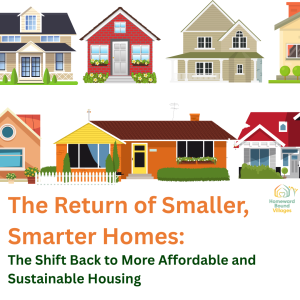Last month, members of the Homeward Bound Villages team had the opportunity to gather with others from across the state for the Greater Indianapolis Multi-Faith Grassroots Housing Summit. This event focused on cooperative housing to educate attendees, share ideas, and build connections across the state for this innovative and much-needed housing structure. We thought that it would be helpful to take the time today to share some key phrases and definitions within the cooperative housing space to build a greater understanding of these key concepts.
Common Cooperative Housing Terms:
Cooperative: A cooperative (or co-op), as it is normally referred to, is an organization owned and run by its members who all share a common goal. Members own equal parts of the co-op and have equal say in decisions. Unlike regular businesses that aim to make profits for owners, co-ops work to provide services or products to their members at the lowest possible cost.
In the case of Karwick Village, the Karwick Village Members will make up the cooperative, with each resident having an equal vote in decisions for the community. Our cooperative structure at Karwick Village allows for our units to remain forever affordable because Homeward Bound Villages owns the land at Karwick Village, and members rent their units.
Community Land Trust: A community land trust (CLT) is a nonprofit organization that owns land for the benefit of a local community. The trust takes care of this land for the long term, using it for affordable housing, community gardens, public buildings, business spaces, and other things that help the community.
Homeward Bound Villages acts as a community land trust for Karwick Village. By retaining ownership of the land that Karwick Village occupies, we ensure that this land and the units remain forever affordable.
Income Limits: Income Limits are set by HUD and primarily used to determine eligibility for various affordable housing programs, like public housing and the Housing Choice Voucher Program (Section 8). In essence, they help ensure that assistance is targeted towards those with the greatest housing needs. These limits are typically based on household size and gross or net income, and they can vary based on the specific program and geographic location.
Most affordable housing organizations rely on the HUD published guidelines even if they aren’t receiving subsidies but Income Limit data can be used for all income ranges when targeting specific types of housing and housing needs. Housing cooperatives may choose to target certain income limits and rely on the HUD Income Limit charts to guide eligibility. The income limits are specific for a geographic location, typically at the county level. They also factor in household size.
Income limits for Karwick Village will rely on HUD Income Limits published for La Porte County and will primarily serve those who are under the 50% Income Limit. A link to the HUD Income Limit charts is included in the reference section below.
Land-Only Cooperative: In a land-only cooperative, members own just the land. The individual homes are owned individually by members with a lease to use the land. This setup is most common in mobile home parks or manufactured housing communities. Other than these examples, land-only co-ops are not very common.
Member/Shareholder: A member or shareholder is a person who owns a share or membership in a cooperative. The term used depends on the type of co-op.
In the case of Karwick Village, these are our residents, who are members of the co-op and each have a say in many aspects of running Karwick Village.
Membership Committee: Many co-ops have a group called a membership committee that reviews applications from people who want to join. This committee approves or denies applications based on rules set by the Co-op board (made up of co-op members). Often, people applying to join must interview with this committee. In some co-ops, the board of directors or the management team handles this job instead.
Site Manager: A site manager is a person hired by the co-op or its management company to handle day-to-day operations at the property. This person might live at the property or somewhere else and might work full-time or part-time. Karwick Village will entrust and support the residents to take on this responsibility. This will help keep operational costs low.
There are many resources online for learning about cooperative housing communities. We’ve included a few links below for key cooperative housing terms.
Reference Links:
National Cooperative Law Center
International Center for Community Land Trusts
The Affordable Housing Initiative




